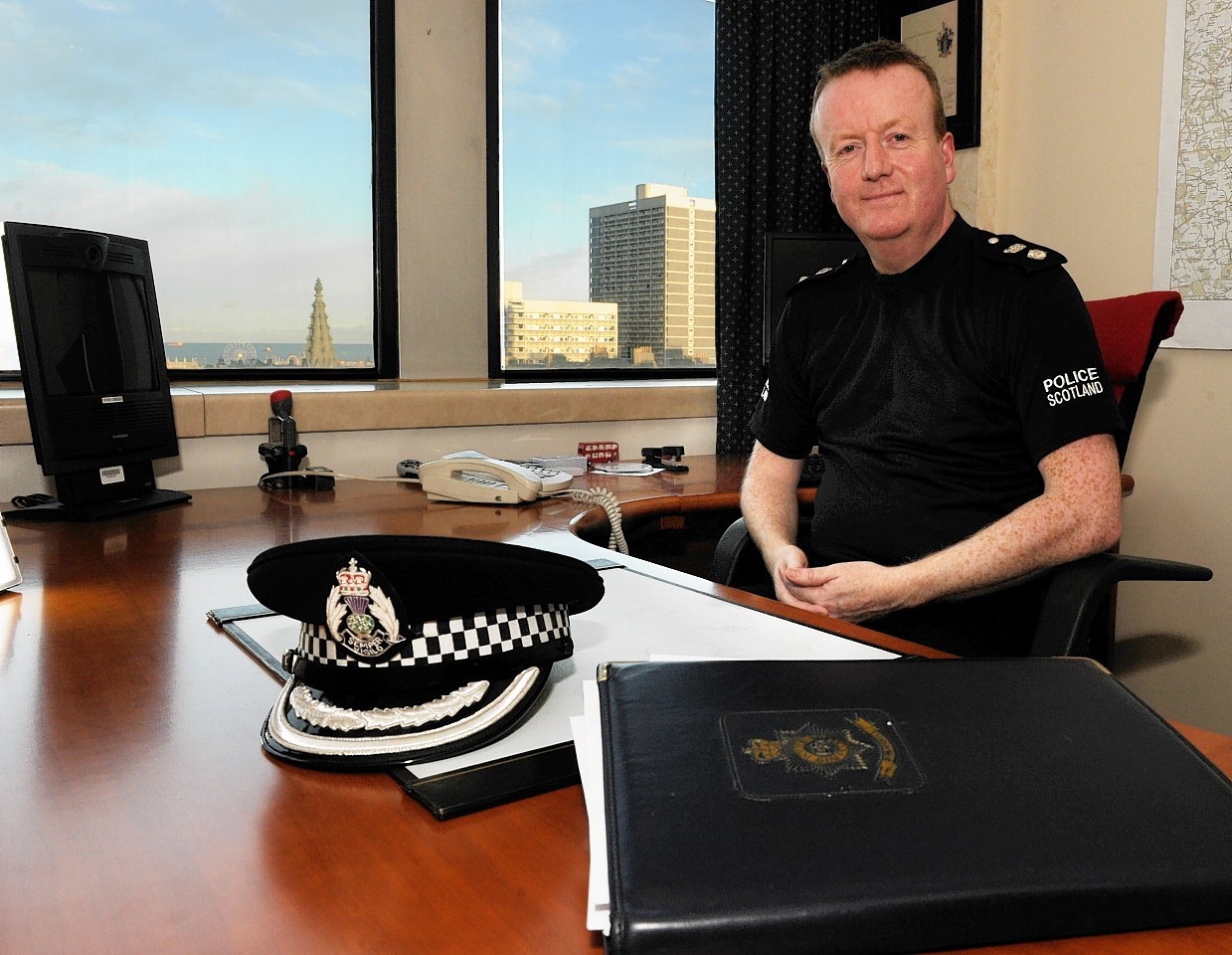Aberdeen’s most senior police officers hopes a glowing report from watchdogs will reassure the biggest critics of Scotland’s merged force that the city is still in safe hands.
Chief Superintendent Adrian Watson said yesterday he was “delighted” with the results of a three-month inspection into the running of the Aberdeen division – which found that people are less likely than ever before to become victims of crime.
It was the first review to be carried out by the HM Inspectorate of Constabulary in Scotland (HMICS) since the formation of Police Scotland in April 2013.
Inspectors said targeted initiatives such as Operation Oak had led to impressive drops in the number of offences, including a 32% reduction in serious assaults, a 64% reduction in thefts from cars and a 15% reduction in vandalism.
It also praised officers for ensuring that community policing models were still meeting local needs, while successfully drawing on national resources for support, including the police horses and helicopter.
The force was challenged by the HMICS on the recruitment and retention of staff after losing many experienced officers to the oil and gas industry, and others to changes in terms and conditions.
It said that Aberdeen had a higher proportion of probationers than other local policing divisions, and was therefore “comparatively inexperienced”.
However, the inspectors discovered that morale among officers was higher in the city than in other divisions inspected, and that initiatives such as “Tutor Units” were effectively supporting younger members of staff.
They also praised the “embedded” culture of partnership working with other organisations.
Mr Watson said his team had worked hard to achieve the positive results, but that they could not afford to become complacent.
He said that – in the face of the biggest budget cuts the force had ever encountered – this was just the beginning of the hard work.
“In a city of this size and importance there are many challenges to face and I can assure you there will be no room for complacency. We will continue to work with others in keeping people safe in Aberdeen,” he vowed.
“I keep on saying you can’t be complacent – this is never an exact science. In this job you are dealing with people when they are at their most vulnerable.”
The inspection of Aberdeen, ordered by HM Inspector of Constabulary in Scotland, Derek Penman, was part of a programme to assess all 14 local divisions of Police Scotland.
The intense review took place over three months, and included surveys of stakeholders and local councillors, and reviewed data, strategies, policies and procedures.
Officials also attended community council meetings and sessions involving other partner agencies, and interviewed police officers and staff.
They also explored how satisfied people in Aberdeen were with their police service, discovering that the “majority” were happy and that confidence in the police was high.
“Confidence and satisfaction levels in Aberdeen in 2014-15 are slightly below those in Scotland generally, although the most recent monthly data indicates that satisfaction and confidence rates in the division are rising,” the inspectors said.
“The officers we spoke to in Aberdeen described a greater attachment to and familiarity with their local communities than officers we spoke to in other divisions.”
Mr Watson said that although tackling the statistics was crucial, knowing that the community was behind them was their biggest driving force.
“In terms of figures themselves, yes, crime is well down and detection rates are well up, but what matters more to me is the community feedback,” he said.
“The figures give me direction, but the success for me is getting positive feedback.”
The formation of Police Scotland – merging eight forces into one – raised fears that convictions could be compromised and officers would be taken off the beat.
Mr Watson said he hoped that even the most sceptical could take comfort from what Aberdeen division had achieved so far.
“I was a supporter of the organisation coming together, but I knew it was never going to be easy. Change of this scale was never going to be easy,” he said.
“Hopefully people can take some reassurance from this.”
The HMICS has given Aberdeen division four recommendations to work with, including providing local councillors with more information on the working of the division.
Last night, politicians from the across the north-east welcomed the report.
Councillor Martin Greig, chairman of the Community Safety Partnership, said the city was “blessed” with a dedicated team of professionals.
“This is a splendid report that confirms that Aberdeen police are committed to very high standards of caring for the public,” he said.
MSP for Aberdeen Central, Kevin Stewart, added: “All police officers and staff are to be congratulated for achieving this positive report and I wish them all the best in continuing to improve the vital service that they provide.”
